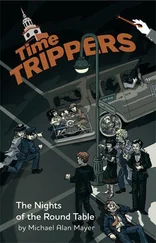The appropriate source of supply in this case could be defined by the collective term “show business” in its widest sense, i. e., television, radio and films. Within a few minutes Frau Wilhelmine had secured acceptances from a much-misunderstood film actress of Scandinavian origin, an uncommonly attractive “pop.” singer and a junior woman announcer from the local television station.
While Frau Wilhelmine was thus engaged, Wyzolla had been polishing glasses with the concentration which he would have devoted to cleaning rifle ammunition. It was one of Tanz’s axioms that nothing should ever surprise a soldier, and Wyzolla’s attitude conformed to it perfectly. Hence, he remained utterly unimpressed when a page appeared in the Green Salon and sidled up to him.
“There are two gentlemen downstairs.”
“Well?” Wyzolla shrugged and resumed his glass-polishing. “There may be three or four, for all I care.”
“They want a word with you,” the page persisted in a whisper.
“Maybe,” said Wyzolla, “but I don’t want a word with them. Can’t you see I’m busy?”
He ignored the page, who retreated in some confusion. Frau Wilhelmine crossed out some entries on her notepad and made some more. The page reappeared.
“The two gentlemen are still waiting in the hall. They say it’s important.”
“Not to me it isn’t,” Wyzolla said laconically.
“They say they only want some information.”
“Can’t give them any,” said Wyzolla. “Not competent to. Don’t bother me. Got things to do.”
Prévert, Hartmann and Ulrike were sitting in a café in the Nürnberger Strasse.
“Don’t worry, Rainer,” said Ulrike, “I know Monsieur Prévert won’t let us down.” She smiled at Prévert. “General Tanz has turned up already—with an escort, as usual.”
“An escort?” asked Prévert, without betraying undue interest.
“A sort of body-guard, I suppose. A tough young man who doesn’t say much—I saw him earlier on when I visited my mother. She’s making arrangements for the party and he’s helping her. Tanz generously lent him to her for the occasion.”
“What’s the youngster’s name?” asked Prévert.
“Wyzolla.”
Prévert leant back in his chair contentedly. “Excellent,” he said. “Tell me more.”
Ulrike ran through the list of invitations. “Mother had put a note beside Kahlenberge’s name: ‘plus French guest.’ Is that you, Monsieur Prévert?”
“Yes, I’m a guest of a guest, and if Kahlenberge can invite someone I don’t see why you shouldn’t.”
“In that case, my guest’s name is Rainer Hartmann.”
“Clever girl—that’s what I hoped you were going to say.”
“I can’t ask Ulrike to do that,” Hartmann said promptly.
“My dear boy,” said Prévert, “what do you mean? The fur’s going to fly tonight anyway. We needn’t worry about a little subterfuge like that.”
“I’ve remembered something else,” Ulrike said. “While I was with Mother she invented an errand for Wyzolla to get him out of the room. While he was gone she ’phoned reception and asked for more details about the two men who had asked to speak to him.”
“Well? Did she get what she wanted?”
“Apparently not. She looked rather at a loss when she put the ’phone down, and it’s unlike my mother to be flummoxed by anything.”
Prévert had suddenly assumed an air of urgency. He got up, issued a few final instructions and took his leave. “I’ll leave you to yourselves now. You could put it down to my sense of delicacy if you like, but you’d be wrong.”
“I wouldn’t disturb you unless it was absolutely necessary,” said Prévert as he entered Kahlenberge’s room. “I see you’re doing some more work on your lecture.”
I’m making a genuine attempt to finish it,” Kahlenberge said, pointing to his manuscript, “but I don’t feel I ever will.”
“Very perceptive of you,” Prévert commented cheerfully.
Kahlenberge shuffled his papers together. “I can’t remember a time when you didn’t have some special request to make. Well, what is it now?”
Prévert lowered his bulk on to the sofa, carefully arranging the cushions first.
“Of course I want something,” he said. “My primary concern is to entertain you as pleasantly as possible—while at the same time interesting you in the next phase of my plans. I should also like to make a couple of telephone calls at your expense. I think they’ll intrigue you.”
Prévert’s first call was to the West Berlin Senator. “Just mention my name,” he told officials who tried to be obstructive.
Within a few minutes the Senator was on the line. He sounded pleased to hear from Prévert again, and since both men were seasoned veterans of a thousand telephone battles and neither had any marked predilection for complex formalities they reached agreement in a surprisingly short space of time. Prévert merely expressed a wish for some co-operation from an experienced Berlin police officer, and the Senator said: “Leave it to me.” That was all.
Shortly afterwards, Chief-Inspector Müller-Meidrich telephoned. Müller-Meidrich had learned his trade under Chief Superintendent Tantau, formerly head of the Berlin homicide department and highly thought of in professional circles. He received the following information: at about 3 p.m. two men had turned up at the reception desk in the Hotel am Kurfürstendamm and asked to speak to someone called Wyzolla. Who were these men and why had they come?
“Well soon find out,” said Müller-Meidrich. “I’ll call you back.”
“Who’s Wyzolla?” Kahlenberge asked Prévert when he had rung off.
“A young man who was sitting in a car in Dresden the other night—to be precise, in a street just round the corner from the Sterngasse.”
Kahlenberge shook his bald dome of a head in exasperation. “And what’s that supposed to mean?”
“A murder was committed in the said Sterngasse—and I may say that murder is a pale description of what took place there.”
Kahlenberge raised both hands as though he were about to protest, then let them sink again impotently. “And I always thought,” he said with an effort, “that you revelled in the bizarre and mysterious. I thought that was the reason why you didn’t dismiss Hartmann’s story as a piece of grotesque nonsense, but I’m beginning to see now—you’re in dead earnest.”
“I’ve never been capable of dismissing violent death as a sort of diabolical joke.”
Kahlenberge rose to his feet abruptly, knocking the draft of his lecture off the table as he did so. It fluttered to the floor and lay there like so much waste paper. Neither man looked at it.
“If your assumptions are correct,” he said in a dull voice, “if what you suspect turns out to be based on fact, where do we go from there?”
Prévert smiled grimly. “Call a general a general, by all means, but never hesitate to call a criminal a criminal.”
The telephone rang shrilly. Prévert picked up the receiver and gave his name. Muller-Meidrich was on the line again.
“We’re extremely grateful for your tip, Herr Prévert. I got in touch with the hotel receptionist at once. He’s pretty certain that the two men who wanted to speak to Wyzolla were detectives or agents of some kind. I immediately consulted all our departments, but none of them had detailed any men for such an assignment.”
“They needn’t necessarily have been members of the Berlin C. I. D.,” Prévert said. “There are American, British and French agencies here in Berlin, don’t forget.”
“I know,” replied Müller-Meidrich. “There’s a wide choice. However, even hotel receptionists have flashes of inspiration occasionally, and this seems to have been a case in point. Apparently, he sent one of the hotel staff after them, not a uniformed page but a man from the accounts department. He saw them get into a car parked near the Gedächtniskirche. It had an East German number-plate.”
Читать дальше












